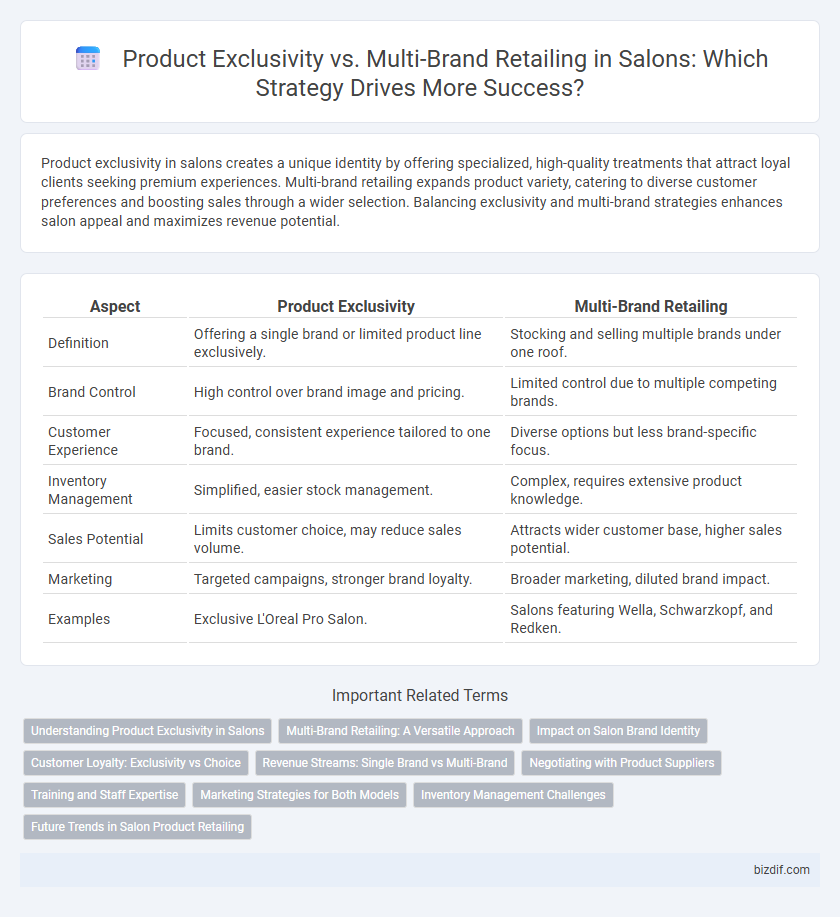Product exclusivity in salons creates a unique identity by offering specialized, high-quality treatments that attract loyal clients seeking premium experiences. Multi-brand retailing expands product variety, catering to diverse customer preferences and boosting sales through a wider selection. Balancing exclusivity and multi-brand strategies enhances salon appeal and maximizes revenue potential.
Table of Comparison
| Aspect | Product Exclusivity | Multi-Brand Retailing |
|---|---|---|
| Definition | Offering a single brand or limited product line exclusively. | Stocking and selling multiple brands under one roof. |
| Brand Control | High control over brand image and pricing. | Limited control due to multiple competing brands. |
| Customer Experience | Focused, consistent experience tailored to one brand. | Diverse options but less brand-specific focus. |
| Inventory Management | Simplified, easier stock management. | Complex, requires extensive product knowledge. |
| Sales Potential | Limits customer choice, may reduce sales volume. | Attracts wider customer base, higher sales potential. |
| Marketing | Targeted campaigns, stronger brand loyalty. | Broader marketing, diluted brand impact. |
| Examples | Exclusive L'Oreal Pro Salon. | Salons featuring Wella, Schwarzkopf, and Redken. |
Understanding Product Exclusivity in Salons
Product exclusivity in salons enhances brand identity by offering unique, high-quality products not available through multi-brand retailers, fostering customer loyalty and premium service perception. Exclusive partnerships with select manufacturers enable salons to differentiate their offerings and command higher price points, driving increased revenue. Understanding the impact of product exclusivity helps salons strategically position themselves in a competitive market while maintaining consistent product availability and professional expertise.
Multi-Brand Retailing: A Versatile Approach
Multi-brand retailing in salons offers a versatile approach by providing clients with an extensive range of hair care, skincare, and beauty products from various reputable brands, enhancing customer choice and satisfaction. This strategy maximizes revenue potential by appealing to diverse consumer preferences and trends, allowing salons to adapt quickly to market demands. Offering multiple brands also fosters trust and credibility, as clients perceive salons as knowledgeable and committed to quality through curated selections.
Impact on Salon Brand Identity
Product exclusivity in salons enhances brand identity by creating a unique, recognizable image linked to select high-quality offerings, fostering customer loyalty through distinctiveness. Multi-brand retailing provides variety, appealing to a broader clientele but may dilute the salon's core brand message and reduce perceived specialization. Balancing exclusivity and diversity influences customer perception, shaping whether the salon is seen as a niche expert or a generalist retailer.
Customer Loyalty: Exclusivity vs Choice
Product exclusivity in salons fosters strong customer loyalty by offering unique treatments and branded products unavailable elsewhere, creating a sense of prestige and trust. Multi-brand retailing appeals to customer choice, attracting clients who seek variety and personalized options, enhancing satisfaction but potentially diluting brand loyalty. Balancing exclusivity with diverse product offerings can optimize customer retention by satisfying both loyal brand advocates and variety-seeking consumers.
Revenue Streams: Single Brand vs Multi-Brand
Single-brand salons generate focused revenue streams by building strong brand loyalty and exclusive product sales, often leading to higher profit margins per item. Multi-brand salons diversify income sources by offering various products catering to different customer preferences, increasing overall sales volume but potentially diluting brand identity. Balancing exclusivity and variety is crucial for maximizing salon revenue through tailored marketing and inventory strategies.
Negotiating with Product Suppliers
Negotiating with product suppliers in salon settings requires balancing product exclusivity with multi-brand retailing strategies to maximize profitability and customer loyalty. Exclusive products can differentiate the salon by offering unique treatments, but multi-brand retailing broadens consumer choice and attracts diverse clientele. Strong supplier relationships, volume commitments, and clear agreements on pricing and promotions are essential to leverage better terms and optimize inventory turnover.
Training and Staff Expertise
Product exclusivity in salons demands specialized training to ensure staff mastery over unique formulations and application techniques, enhancing client trust and satisfaction. Multi-brand retailing requires comprehensive staff expertise across diverse product lines, enabling personalized recommendations tailored to varied client needs. Investing in continuous education strengthens salon credibility and drives higher retail sales through informed, confident service.
Marketing Strategies for Both Models
Product exclusivity in salons enhances brand prestige and customer loyalty by offering unique, high-demand items not found elsewhere, driving higher margins through scarcity marketing. Multi-brand retailing increases consumer choice and foot traffic by showcasing a diverse product range, appealing to broader customer segments through competitive pricing and cross-promotion strategies. Effective marketing for exclusive products relies on storytelling and influencer partnerships, while multi-brand approaches benefit from bundled offers and targeted digital campaigns to maximize sales.
Inventory Management Challenges
Product exclusivity in salons simplifies inventory management by streamlining stock with fewer but specialized items, reducing complexity and storage needs. Multi-brand retailing introduces diverse product lines, increasing inventory variability and requiring advanced tracking systems to avoid overstocking or stockouts. Efficient inventory management software and real-time data analytics become essential to balance the assortment and meet client demands across multiple salon brands.
Future Trends in Salon Product Retailing
Future trends in salon product retailing reveal a shift towards personalized, exclusive product lines that enhance brand loyalty and customer experience. Salons investing in product exclusivity can leverage unique formulations and targeted marketing to differentiate themselves in a competitive market. Concurrently, multi-brand retailing remains valuable by offering diverse product options, but the emphasis will increasingly lie on curated selections that align with salon identity and customer preferences.
Product exclusivity vs Multi-brand retailing Infographic

 bizdif.com
bizdif.com